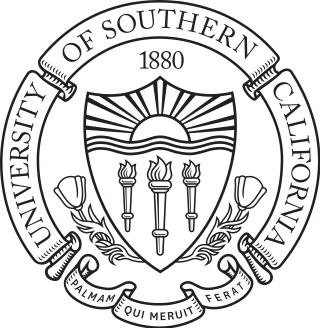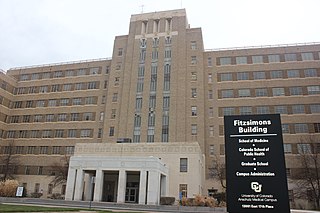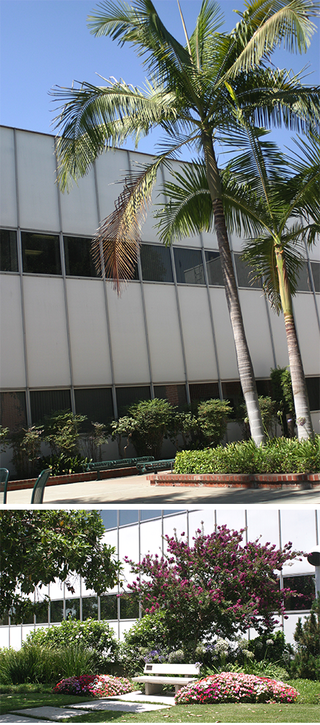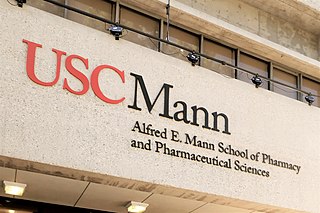Related Research Articles

The University of Southern California is a private research university in Los Angeles, California, United States. Founded in 1880 by Robert Maclay Widney, it is the oldest private research university in California. The university is composed of one liberal arts school, the Dornsife College of Letters, Arts and Sciences, and 22 undergraduate, graduate, and professional schools, enrolling roughly 21,000 undergraduate and 28,500 post-graduate students from all fifty U.S. states and more than 115 countries. It is a member of the Association of American Universities, which it joined in 1969.

Embry–Riddle Aeronautical University (ERAU) is a private university focused on aviation and aerospace programs. Founded at Lunken Field in Cincinnati, Ohio in 1926, its main campuses are located in Daytona Beach, Florida, and Prescott, Arizona. It is the largest accredited university system specializing in aviation and aerospace. It has numerous online programs and academic programs offered at satellite locations.

The USC Viterbi School of Engineering is the engineering school of the University of Southern California. It was renamed following a $52 million donation by Andrew J. Viterbi, co-founder of Qualcomm.

The National Institute for Occupational Safety and Health is the United States federal agency responsible for conducting research and making recommendations for the prevention of work-related injury and illness. NIOSH is part of the Centers for Disease Control and Prevention (CDC) within the U.S. Department of Health and Human Services. Despite its name, it is not part of either the National Institutes of Health nor OSHA. Its current director is John Howard.

Jacksonville University (JU) is a private university in Jacksonville, Florida, United States. Located in the city's Arlington district, the school was founded in 1934 as a two-year college and was known as Jacksonville Junior College until September 5, 1956, when it shifted focus to building four-year university degree programs and later graduated its first four-year degree candidates as Jacksonville University in June 1959. It is a member of the Independent Colleges and Universities of Florida and is accredited by the Southern Association of Colleges and Schools (SACS) and the Association to Advance Collegiate Schools of Business (AACSB). JU's student body currently represents more than 40 U.S. states and approximately 45 countries around the world. As a Division I institution, it fields 18 varsity athletics teams, known as the JU Dolphins, as well as intramural sports and clubs. Among the top majors declared by JU students are aviation management, biology, nursing, business, and marine science.
Capitol Technology University is a private university in South Laurel, Maryland, near Washington, DC. The university was founded in 1927 as the Capitol Radio Engineering Institute by a former US Navy Radioman. CREI changed its name to Capitol Institute of Technology in 1964, changed its name again to Capitol College in 1987, and assumed its present name in 2014. Capitol offers undergraduate and graduate programs specializing in engineering, computer science, information technology, and business. It is classified among "Special Focus Institutions—Schools of Engineering" and is a National Center of Academic Excellence in Information Assurance Education.

York College is a public senior college in Jamaica, Queens, New York City, United States. It is a senior college in the City University of New York (CUNY) system. Founded in 1966, York was the first senior college founded under the newly formed CUNY system, which united several previously independent public colleges into a single public university system in 1961. The college is a member-school of Thurgood Marshall College Fund. The college enrolls more than 6,000 students as of fall 2022.
The Keck School of Medicine of the University of Southern California teaches and trains physicians, biomedical scientists and other healthcare professionals, conducts medical research, and treats patients. Founded in 1885, it is the second oldest medical school in California after the UCSF School of Medicine.

École nationale de l'aviation civile (ENAC) is one of 205 colleges accredited to award engineering degrees in France. ENAC is designated as a grande école by the Conférence des Grandes écoles (CGE), a non-profit organisation which certifies and monitors grandes écoles. ENAC was founded on 28 August 1949 to provide initial and continuing education in the field of civil aviation. The school is an établissement public à caractère scientifique, culturel et professionnel, and operates under the oversight of the Ministry of Ecological Transition. Affiliated with the University of Toulouse and Aerospace Valley, it is one of the five founders of France AEROTECH.
The academics of the University of Southern California center on The College of Letters, Arts, and Sciences, the Graduate School, and its 17 professional schools.

John Jackson Howard is an American physician, professor, and public health administrator who served a 6-year term as the director of the National Institute for Occupational Safety and Health and was appointed to be a special coordinator to respond to the health effects of the September 11 attacks. In this role, Howard advocated for rescue workers, introducing a program to provide screening, medical exams, and treatment for them. In 2009, Howard was again appointed as director of NIOSH and as World Trade Center Programs coordinator for HHS. In 2011, Howard became the Administrator of the World Trade Center Health Program. In 2016, he became the first person to be appointed to a third 6-year term as NIOSH director, and was reappointed to a fourth term in 2021.
NIOSH Education and Research Centers are multidisciplinary centers supported by the National Institute for Occupational Safety and Health for education and research in the field of occupational health. Through the centers, [NIOSH] supports academic degree programs, research, continuing education, and outreach. The ERCs, distributed in regions across the United States, establish academic, labor, and industry research partnerships. The research conducted at the centers is related to the National Occupational Research Agenda (NORA) established by NIOSH.
The Mountain & Plains Education and Research Center is one of eighteen Education and Research Centers funded by the National Institute for Occupational Safety and Health (NIOSH). NIOSH and the NIOSH Education and Research Centers are affiliated with the Centers for Disease Control and Prevention.
Spartan College of Aeronautics and Technology (Spartan) is a private for-profit aviation college in Tulsa, Oklahoma. It was originally established to provide pilot and technicians for Spartan Aircraft Company but outlived its parent company and continues to train pilots and mechanics into the 21st Century. The main campus is adjacent to Tulsa International Airport, with another campus used for flight training at Richard Lloyd Jones Jr. Airport.

The Colorado School of Public Health is an accredited, collaborative school of public health representing three Colorado public educational and research institutions: the University of Colorado, Colorado State University and the University of Northern Colorado. The school is accredited by the Council on Education for Public Health. The school operates on three university campuses: the University of Colorado Anschutz Medical Campus in Aurora, Colorado, Colorado State University in Fort Collins, Colorado, and the University of Northern Colorado in Greeley, Colorado.

The German University of Administrative Sciences Speyer, is a national graduate school for administrative sciences and public management located in Speyer, Rhineland-Palatinate, Germany. Founded in 1947 by the French occupational authorities as a grande école, today it is operated under the joint responsibility of both the Federal Republic (Bund) and all 16 German states (Länder). It runs four Master's programs, grants doctoral degrees and habilitations, offers a postgraduate certificate program, and administers programs of executive education. The school is a major training ground for German and international senior government officials. Noted alumni and faculty include former President of Germany Roman Herzog, Professor Niklas Luhmann; former Minister of Defence Christine Lambrecht, current Justice at the Federal Constitutional Court of Germany Heinrich Amadeus Wolff, former President of the Bundesbank Helmut Schlesinger, former Prosecutor General of Germany Alexander von Stahl, and CEO of BASF Jürgen Strube.

National University is a private university headquartered in San Diego, California, United States. Founded in 1971, National University offers academic degree programs at campuses throughout California, a satellite campus in Nevada, and various programs online. Programs at National University are designed for adult learners. On-campus classes are typically blended learning courses, concentrated to four weeks or on weeknights with occasional Saturday classes. The university uses asynchronous learning and real-time virtual classrooms for its online programs.

The USC Division of Biokinesiology and Physical Therapy is a division of the Herman Ostrow School of Dentistry at the University of Southern California, focusing on research, training, and practice related to physical therapy and rehabilitation. The division grants doctoral degrees in physical therapy (DPT) and biokinesiology (PhD), as well as master's degrees in biokinesiology. In addition, the division offers residency programs in orthopedic physical therapy, neurologic physical therapy, sports physical therapy, as well as pediatric physical therapy.

Arts et Métiers ParisTech is a French engineering and research institute of higher education. It is a grande école, recognized for leading in the fields of mechanics and industrialization. Founded in 1780, it is among the oldest French institutions and is one of the most prestigious engineering schools in France. It has been consistently ranked among the top ten French engineering schools and was ranked fifth in France for Mechanical Engineering in the Shanghai ranking 2018.

The USC Alfred E. Mann School of Pharmacy and Pharmaceutical Sciences is the pharmacy school of the University of Southern California, originally established in 1905 as USC College of Pharmacy. On November 17, 2022, the University of Southern California released an announcement stating that the school will be renamed the USC Alfred E. Mann School of Pharmacy and Pharmaceutical Sciences and will receive a $50 million endowment for student scholarships, faculty recruitment and integrating a university-wide research infrastructure related to biomedical innovation across USC’s University Park and Health Sciences campuses. The School is led by Dean Vassilios Papadopoulos.
References
- ↑ Mittler, Elliott (1991), "Survival in the Face of Success: The Case of the Institute of Safety and Systems Management at the University of Southern California", International Journal of General Systems, 19 (1): 11–24, doi:10.1080/03081079108935159
- ↑ USC History, see entry under "1952", 6 March 1987, archived from the original on 25 May 2011, retrieved 26 May 2012
- ↑ Trombley, William (6 March 1987), "USC May Deal Major Program to U of Denver", Los Angeles Times, retrieved 26 May 2012
- ↑ Charles Bolden Biography, July 2009, retrieved 26 May 2012